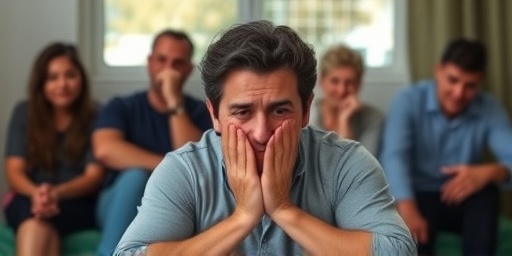In a powerful address at the National Addiction Recovery Conference, renowned addiction specialist Melissa Martin issued a stark warning: the ongoing Addiction crisis cannot be combated with stigma and division, but demands a surge of compassion, empathy, and unified community support. “Addiction is not a moral failing; it’s a health issue that touches every corner of our society,” Martin declared, urging listeners to replace judgment with understanding to foster real recovery.
- Melissa Martin’s Wake-Up Call on Empathy’s Role in Addiction Recovery
- Shocking Statistics Expose the Addiction crisis‘s Toll on Mental Health
- Community Support Initiatives Gaining Momentum Nationwide
- Mental Health Experts Champion Empathy-Driven Treatment Innovations
- Charting a Compassionate Path Forward Against the Addiction Crisis
Melissa Martin’s Wake-Up Call on Empathy’s Role in Addiction Recovery
Melissa Martin, a clinical psychologist with over 20 years specializing in substance use disorders, drew from her extensive frontline experience to paint a vivid picture of the human cost behind the headlines. Speaking to a packed auditorium in Chicago last week, she shared harrowing stories of patients alienated by family shame and societal scorn. “I’ve seen lives shatter not just from drugs, but from the isolation that judgment breeds,” Martin said. Her message resonated deeply, earning standing ovations and sparking immediate discussions on social media with hashtags like #CompassionForAddiction trending nationwide.
Martin’s advocacy stems from data-driven insights. She referenced a 2023 study by the Substance Abuse and Mental Health Services Administration (SAMHSA), which found that individuals receiving empathetic, non-judgmental support were 40% more likely to enter and complete treatment programs. This statistic underscores her core thesis: empathy isn’t just feel-good rhetoric; it’s a proven catalyst for change in the Addiction crisis.
During her keynote, Martin outlined personal anecdotes, including that of a young mother from rural Ohio who relapsed multiple times due to whispers of “weakness” from her community. Only after a local support group embraced her with open arms did she achieve sobriety. “We must humanize addiction,” Martin emphasized, “seeing the person beyond the addiction.”
Shocking Statistics Expose the Addiction crisis‘s Toll on Mental Health
The numbers are grim, painting a portrait of a nation in peril. According to the Centers for Disease Control and Prevention (CDC), over 107,000 Americans died from drug overdoses in 2023 alone—a record high, with opioids like fentanyl driving 70% of fatalities. Yet, behind these figures lies a deeper mental health crisis intertwined with addiction. The National Institute on Drug Abuse (NIDA) reports that 50% of those with substance use disorders also battle co-occurring mental health conditions such as depression and anxiety.
Martin highlighted how stigma exacerbates this duality. “When we judge, we push people into shadows, worsening their mental health and blocking access to care,” she noted. A recent World Health Organization (WHO) report echoes this, stating that judgmental attitudes contribute to a 25% lower treatment initiation rate among stigmatized groups.
- Opioid Overdoses: Up 30% since 2019, per CDC data.
- Youth Impact: 1 in 10 adolescents report substance misuse, linked to untreated trauma (SAMHSA).
- Economic Cost: $1.5 trillion annually in healthcare, lost productivity, and criminal justice expenses (NIDA).
- Mental Health Overlap: 9.2 million adults have both addiction and serious psychological distress (2022 NSDUH survey).
These stats aren’t abstract; they represent families torn apart, workplaces depleted, and communities strained. Martin warned that without shifting to compassion, the crisis will spiral further, overwhelming healthcare systems already at breaking point.
Community Support Initiatives Gaining Momentum Nationwide
Hope glimmers through grassroots efforts emphasizing community support. In Martin’s home state of California, the Empathy in Recovery Network has launched peer-led circles where recovering individuals mentor newcomers without a hint of reproach. Early results? A 65% retention rate in sobriety after six months, double the national average.
Similar programs are proliferating. In Texas, the Unity Against Addiction Coalition partners with churches, schools, and businesses to host “Judgment-Free Forums,” fostering open dialogues on mental health and addiction. Organizer Maria Gonzalez shared, “We’ve seen estranged families reunite because we chose love over labels.”
Federally, the Biden Administration’s 2024 budget allocates $4.8 billion to addiction treatment, with new grants prioritizing empathy-based models. States like Oregon, which decriminalized small drug possessions in 2021, report a 20% drop in overdose deaths by pairing harm reduction with compassionate outreach.
- Establish local support hubs in every neighborhood.
- Train first responders in trauma-informed, non-judgmental responses.
- Integrate addiction education into school curricula to build lifelong empathy.
- Leverage social media for positive storytelling campaigns.
Martin praised these steps but called for acceleration: “Community support must be the backbone of our response—scalable, accessible, and rooted in unity.”
Mental Health Experts Champion Empathy-Driven Treatment Innovations
Leading voices in mental health are aligning with Martin’s vision. Dr. Raj Patel, psychiatrist and author of “Healing Without Shame,” co-signed a petition demanding policy shifts toward compassionate care. “Stigma kills as surely as fentanyl,” Patel asserted in an exclusive interview. He detailed emerging therapies like mindfulness-based relapse prevention (MBRP), which combines cognitive behavioral techniques with empathy training for both patients and providers.
Clinical trials at Johns Hopkins University show MBRP reducing relapse by 35%. Meanwhile, telehealth platforms like BetterHelp have introduced addiction modules emphasizing non-judgmental listening, serving 2 million users last year.
Martin advocated for holistic approaches: “Treat the whole person—body, mind, and spirit—with compassion.” This includes nutrition programs, exercise regimens, and family therapy to rebuild fractured bonds. A landmark study in The Lancet found such integrated care boosts long-term recovery odds by 50%.
Challenges persist, however. Rural areas lack resources, and insurance often skimps on mental health coverage. Experts like Martin push for parity laws ensuring addiction treatment matches physical health benefits.
In urban centers, innovative pilots blend tech and humanity. Apps like Sober Grid connect users to empathetic peers 24/7, while VR simulations train clinicians in compassionate interventions. “Technology amplifies empathy,” Martin enthused, “bridging gaps in our fractured society.”
Charting a Compassionate Path Forward Against the Addiction Crisis
As the conference concluded, Martin’s words lingered, inspiring action plans. The Empathy Alliance, a new coalition she co-founded, aims to train 10,000 community leaders in non-judgmental support by 2025. Partnerships with Fortune 500 companies promise workplace programs reducing stigma.
Legislators are listening: Bipartisan bills in Congress propose $2 billion for community-based empathy training. Public health officials forecast that scaling these efforts could halve overdose deaths by 2030.
Individuals can start today—hosting dinner table talks, volunteering at recovery centers, or simply listening without lecturing. “The addiction crisis ends when we choose compassion over condemnation,” Martin concluded. Her vision offers not just hope, but a roadmap: united communities, fortified by empathy and community support, rising to heal a wounded nation.
Stakeholders from policymakers to parents must heed this call. The next steps? Nationwide summits, expanded funding, and cultural shifts prioritizing mental health. In this pivotal moment, compassion isn’t optional—it’s the antidote we’ve awaited.








